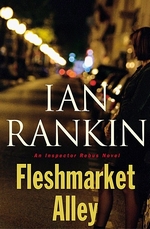 Fleshmarket Alley / Fleshmarket Close
Fleshmarket Alley / Fleshmarket Close
by Ian RankinSeries: John Rebus, #15
Hardcover, 420 pg.
Little, Brown and Company, 2005
Read: May 18 – 23, 2018

| Rebus had never seen children in a mortuary before, and the sight of« fended him. This was a place for professionals, for adults, for the widowed. It was a place for unwelcome truths about the human body. It was the antithesis of childhood.
Then again, what was childhood to the Yurgii children but confusion and desperation? Which didn’t stop Rebus pinning one of the guards to the wall. physically, of course, not using his hands. But by dint of placing himself: an intimidating proximity to the man and then inching forward, until the guard had his back to the wall of the waiting area. “You brought kids here?” Rebus spat. |
This — even by Rebus’ standards — is a dark book, but we keep finding Rebus pushing back against it. It actually almost seems against his character — the cynicism and pessimism that is so definitive of him seems frequently absent. That’s not a bad thing — it’s just a little strange when you stop and think about it. Of course, there’s an easy line to draw between idealism and cynicism, and Rebus has always been an absolutist about justice — and doesn’t let much stand in his way to pursue it. This time there’s a lot more injustice that he seems to be targeting. Something about this murder that has gotten under his skin.
Maybe it’s because he knows it could be one of the last cases he’s involved in — St. Leonard’s has been reorganized and no longer has a CID, so the detectives have been reassigned throughout the city. He and Clarke were sent somewhere that reminds them on a regular basis that they’re not welcome — Rebus doesn’t even get a desk. The message is clear: he should retire. Fat chance of that happening while he can say anything about it.
Which leads to Rebus jumping in to help some old friends investigate the what appears to be a race-based murder, which ends up opening up a tangled web of crimes in so many circles it’s difficult to summarize (I deleted a couple of attempts to do that because they ended up undreadable) while staying spoiler-free. Just know that pretty much everywhere Rebus goes, he’s going to find something else that’s very, very wrong. The more Rebus learns about the victim — and his life — the less likely the fact that he’s Kurdish seems to play in his killing, but it’s inescapable — the press, other police, and every one he talks to about the case won’t stop bringing it up. It’s easier for everyone when first impressions are right, but when you can’t make the facts fit the narrative, you’d better have a detective like John Rebus around to actually get somewhere.
Siobhan meanwhile, gets involved in a couple of things that aren’t really cases but end up dragging her into one. First, she starts doing a favor for a couple she knew years ago when their daughter was raped and later committed suicide. Now their younger daughter has gone missing and they fear the worst. Also, there’s a couple of skeletons uncovered in Fleshmarket Alley that have an interesting story to tell. One thing leads to another and Siobhan becomes involved in a murder investigation that while not connected to Rebus’ keeps the two of them brushing into one another at interesting points.
We also get to see Big Ger for a few minutes, and isn’t that always fun?
There’s some odd tension between Rebus and Siobhan in these pages — something that feels natural, organic. They’re not as static as Spenser and Hawk (for one bad example), with differing goals, aspirations, etc. It’s good to see this dimension to their relationship, really. It makes be believe in them more.
Dark, tangled, well-paced, oddly timely for something written over a decade ago, and so wonderfully constructed that you really can’t believe it when all the pieces start to fall in place. Fleshmarket Alley/Close is just one more bit of evidence that Ian Rankin is a master of his craft.
—–



